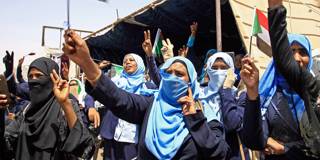Although women have played a crucial part in ending conflicts and energizing protests in Africa and elsewhere, they are often marginalized in the subsequent peacebuilding and political processes. A special international fund to nurture female political leadership would help give women a bigger say in their countries' futures.
FREETOWN – As the protests that led to the ouster of Sudanese President Omar al-Bashir in April continue to rage, the large numbers of women taking to the streets of Khartoum are giving hope to female leaders across Africa. Women, both young and old, have accounted for up to 70% of the protesters in Sudan despite reportedly being targeted with intimidation, harassment, and even rape. The world should recognize their bravery, and take concrete steps to help more African women become political leaders.

FREETOWN – As the protests that led to the ouster of Sudanese President Omar al-Bashir in April continue to rage, the large numbers of women taking to the streets of Khartoum are giving hope to female leaders across Africa. Women, both young and old, have accounted for up to 70% of the protesters in Sudan despite reportedly being targeted with intimidation, harassment, and even rape. The world should recognize their bravery, and take concrete steps to help more African women become political leaders.